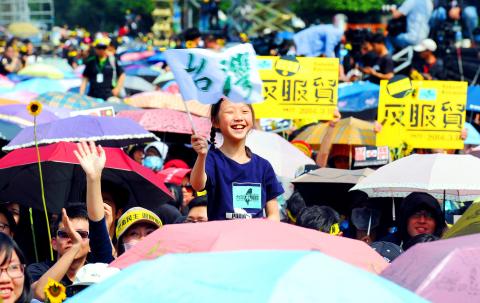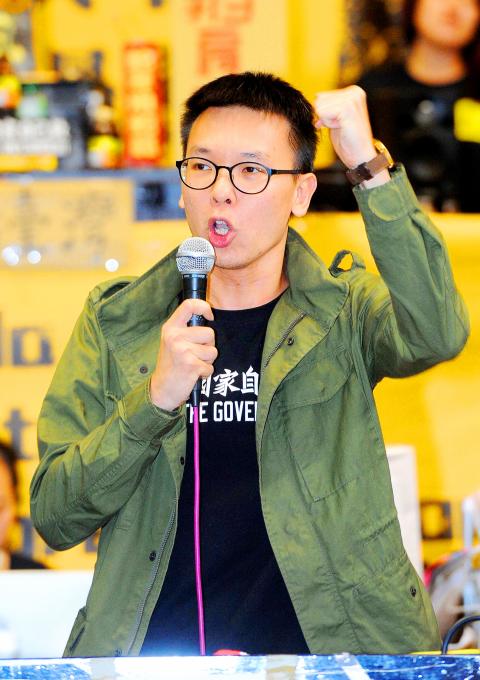The strong showing at the mass protest in front of the Presidential Office Building in Taipei yesterday has given the students who have been occupying the legislative floor for 13 days the confidence to continue their fight for Taiwan’s democracy, they said.
After protest leader Lin Fei-fan (林飛帆) announced that the number of protesters had surpassed 350,000 — and later surpassed 500,000 — a loud cheer erupted in the legislative chamber, which has been occupied by about 200 students since March 18.
“500,000 people have spoken. President Ma Ying-jeou (馬英九), do you still plan on hiding? 500,000 people demand your positive response,” Lin said.

Photo: Sam Yeh. AFP
The protest, a collaboration with civic groups, was the first time since the “Sunflower student movement” began that the students tried to actively bring in outside help.
The protest appeared to gain support after President Ma Ying-jeou (馬英九) rejected the demands the students made in a press conference on Saturday.
Ma conditionally agreed to establish a legislative monitoring mechanism on future cross-strait agreements, but rejected the organization of a citizens’ constitutional conference and the withdrawal of the controversial service trade pact, saying that the monitoring mechanism and the trade pact should be separate issues.

Photo: Wang Min-wei, Taipei Times
The movement’s leadership planned to organize the mass protest on Ketagalan Boulevard to apply pressure to Ma, but asked the students and protesters to head back to the Legislative Yuan compound, which is a few hundred meters from Ketagalan Boulevard, after the scheduled conclusion of the protest at 7pm to continue the original protest.
The leadership’s fear of a lack of manpower was never a concern with protesters packing every road near the Legislative Yuan — Ketagalan Boulevard, Zhongshan S Rd, Zhinan Rd, Qingdao E Rd and Linsen S Rd.
As the mass rally went on in front of the Presidential Office Building, students in the chamber conducted video teleconferences with foreign students who supported their movement in simultaneous rallies in Japan, Hong Kong and Australia.
Outside the Legislative Yuan compound, scheduled activities — including speeches, music performances and movie screenings, went on at Qingdao E Rd and Zhinan Rd, with students at both places watching a live broadcast of the major rally a few blocks away from giant TV screens.
Students returned to the Legislative Yuan compound after the rally ended at about 7:45pm, as members of the public headed home with no major conflicts reported.

Seventy percent of middle and elementary schools now conduct English classes entirely in English, the Ministry of Education said, as it encourages schools nationwide to adopt this practice Minister of Education (MOE) Cheng Ying-yao (鄭英耀) is scheduled to present a report on the government’s bilingual education policy to the Legislative Yuan’s Education and Culture Committee today. The report would outline strategies aimed at expanding access to education, reducing regional disparities and improving talent cultivation. Implementation of bilingual education policies has varied across local governments, occasionally drawing public criticism. For example, some schools have required teachers of non-English subjects to pass English proficiency

‘FORM OF PROTEST’: The German Institute Taipei said it was ‘shocked’ to see Nazi symbolism used in connection with political aims as it condemned the incident Sung Chien-liang (宋建樑), who led efforts to recall Democratic Progressive Party (DPP) Legislator Lee Kun-cheng (李坤城), was released on bail of NT$80,000 yesterday amid an outcry over a Nazi armband he wore to questioning the night before. Sung arrived at the New Taipei City District Prosecutors’ Office for questioning in a recall petition forgery case on Tuesday night wearing a red armband bearing a swastika, carrying a copy of Adolf Hitler’s Mein Kampf and giving a Nazi salute. Sung left the building at 1:15am without the armband and apparently covering the book with a coat. This is a serious international scandal and Chinese

PERSONAL DATA: The implicated KMT members allegedly compiled their petitions by copying names from party lists without the consent of the people concerned Judicial authorities searched six locations yesterday and questioned six people, including one elderly Chinese Nationalist Party (KMT) member and five KMT Youth League associates, about alleged signature forgery and fraud relating to their recall efforts against two Democratic Progressive Party (DPP) legislators. After launching a probe into alleged signature forgery and related fraud in the KMT’s recall effort, prosecutors received a number of complaints, including about one petition that had 1,748 signatures of voters whose family members said they had already passed away, and also voters who said they did not approve the use of their name, Taipei Deputy Chief Prosecutor

TRADE: The premier pledged safeguards on ‘Made in Taiwan’ labeling, anti-dumping measures and stricter export controls to strengthen its position in trade talks Products labeled “made in Taiwan” must be genuinely made in Taiwan, Premier Cho Jung-tai (卓榮泰) said yesterday, vowing to enforce strict safeguards against “origin laundering” and initiate anti-dumping investigations to prevent China dumping its products in Taiwan. Cho made the remarks in a discussion session with representatives from industries in Kaohsiung. In response to the US government’s recent announcement of “reciprocal” tariffs on its trading partners, President William Lai (賴清德) and Cho last week began a series of consultations with industry leaders nationwide to gather feedback and address concerns. Taiwanese and US officials held a videoconference on Friday evening to discuss the